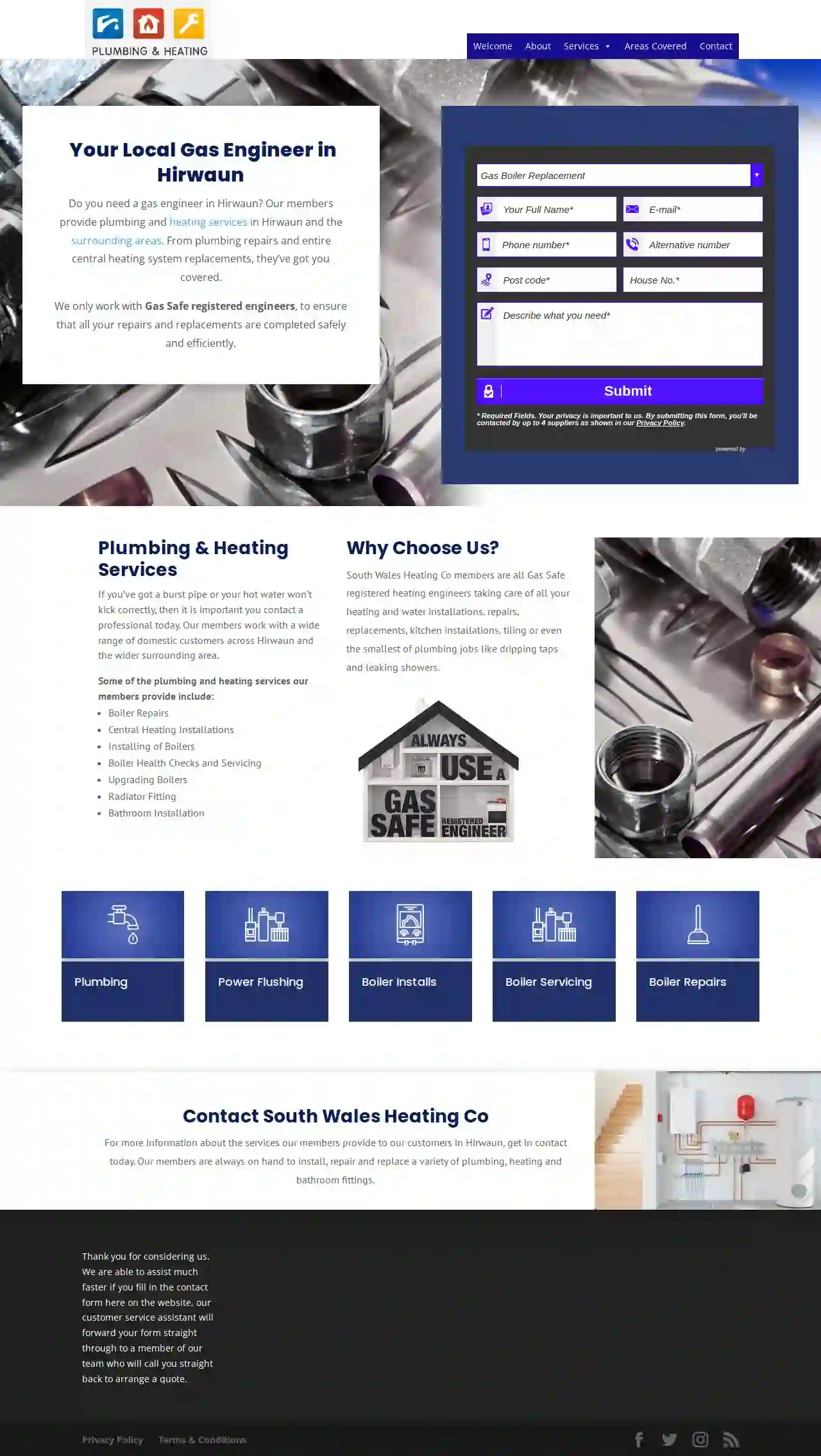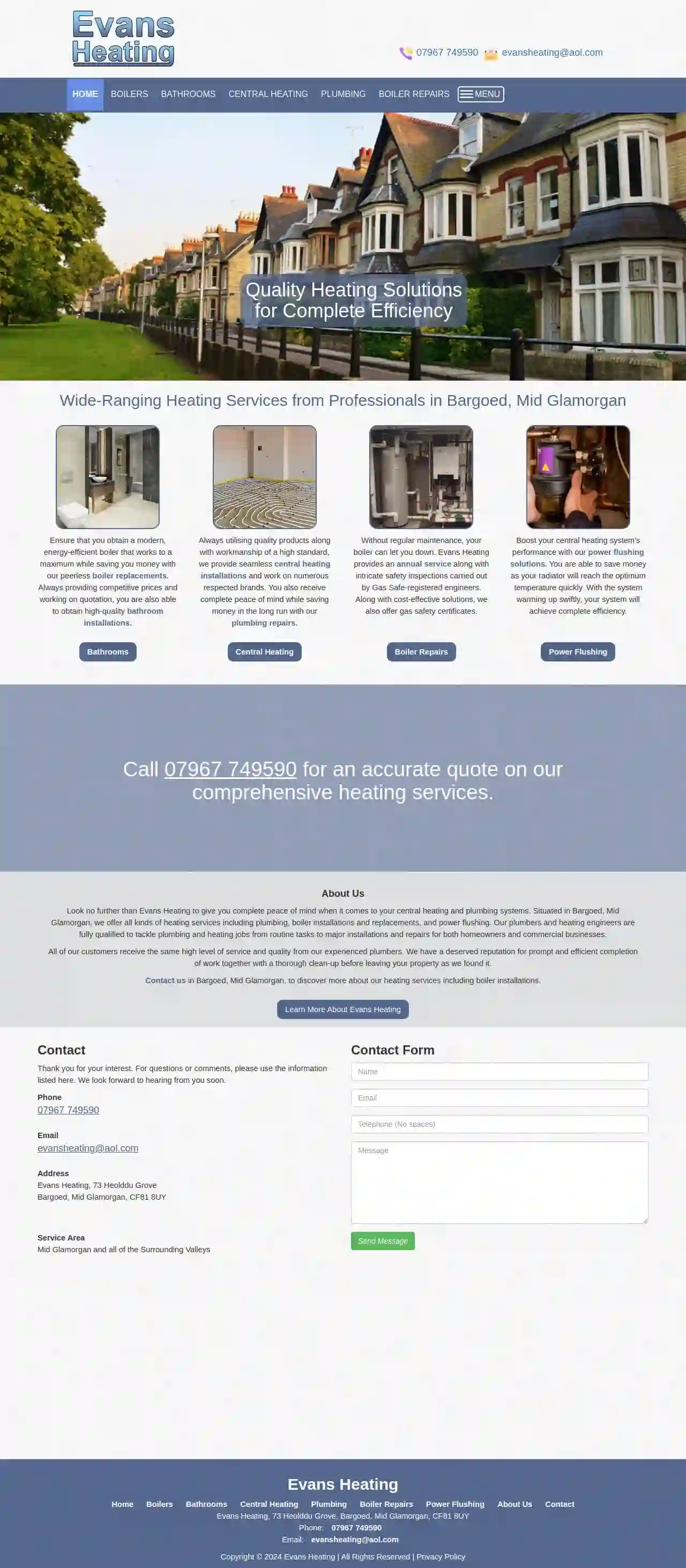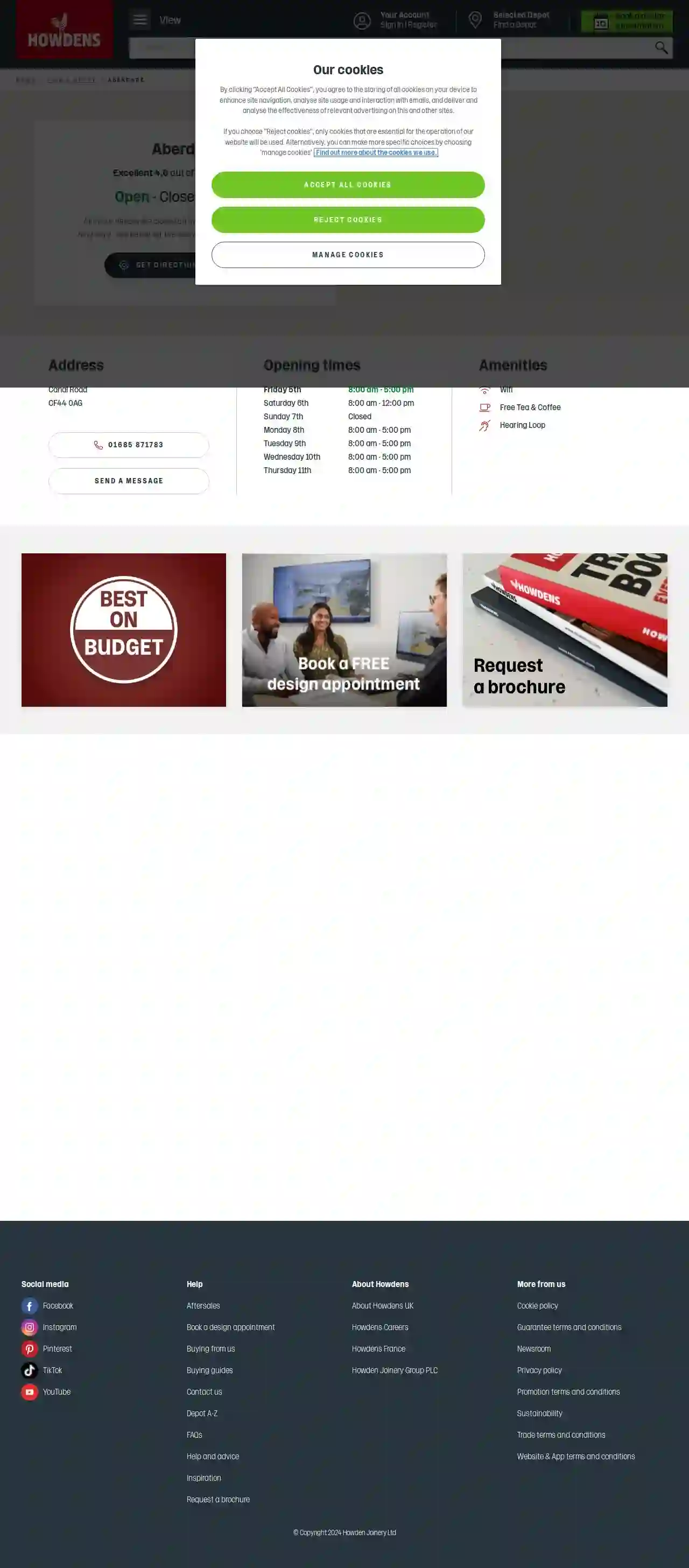HVAC Companies Maerdy
Top HVAC Companies in Maerdy
Get 3 FREE AC and Heating Services quotes for your project today! Compare profiles, reviews, accreditations, portfolio, etc... and choose the best offer.

Artesian Air Conditioning - Cardiff
51 reviewsPontypridd, GBARTESIAN AIR provides energy efficient cooling and heating solutions for homes and businesses across West London, Oxfordshire, and Cardiff. With over 20 years of experience, they offer a complete service, catering to a wide range of needs from single rooms to large corporate headquarters. Artesian Air prides itself on customer satisfaction, ensuring optimal environments for both people and equipment. They specialize in air conditioning and heating systems, helping clients achieve the perfect balance of comfort and efficiency.
- Services
- Why Us?
- Gallery
Get Quote
lee sizer's plumbing and heating
11 reviewsAberdare, GBSouth Wales Heating Co is a network of Gas Safe registered heating engineers serving South Wales and the surrounding areas. They offer a comprehensive range of plumbing and heating services, from small repairs like dripping taps to large installations like central heating systems. Their team of experienced engineers is dedicated to providing safe, efficient, and reliable service to domestic customers. Whether you need a boiler repair, a new boiler installation, or help with your central heating, South Wales Heating Co can help.
- Services
- Why Us?
- Gallery
Get Quote
Response Engineering Solutions Limited
4.56 reviewsCheddar, Somerset, Unit 6, Mendip Vale Trading Estate, BS27 3EL, GBWelcome to Response Engineering Solutions. Response Engineering Solutions Limited is a proactive mechanical and electrical engineering company. We operate within the UK’s wide range of material processing industries, including aggregates, asphalt, concrete, coal, steel-making, product warehousing, water treatment and ship-loading operations. We pride ourselves on our commitment to customer satisfaction through our flexibility and speed of action. Our focus is to provide a prompt, professional and effective response to our clients and prospective clients. Typical enquiries range from project tenders to the reactive emergency supply of site operatives for a breakdown situation and the supply, installation, and maintenance of specialist industrial plant and equipment. We are proud of our proactive approach to health & safety and our commitment to personnel training. Our vision is to be seen as the first point of contact for our customers’ mechanical & electrical engineering and maintenance requirements.
- Services
- Why Us?
- Gallery
Get Quote
Evans Heating
52 reviewsBargoed, Mid Glamorgan, 73 Heolddu Grove, CF81 8UY, GBQuality Heating Solutions for Complete Efficiency. Wide-Ranging Heating Services from Professionals in Bargoed, Mid Glamorgan. Ensure that you obtain a modern, energy-efficient boiler that works to a maximum while saving you money with our peerless boiler replacements. Always providing competitive prices and working on quotation, you are also able to obtain high-quality bathroom installations. Bathrooms. Always utilising quality products along with workmanship of a high standard, we provide seamless central heating installations and work on numerous respected brands. You also receive complete peace of mind while saving money in the long run with our plumbing repairs. Central Heating. Without regular maintenance, your boiler can let you down. Evans Heating provides an annual service along with intricate safety inspections carried out by Gas Safe-registered engineers. Along with cost-effective solutions, we also offer gas safety certificates. Boiler Repairs. Boost your central heating system's performance with our power flushing solutions. You are able to save money as your radiator will reach the optimum temperature quickly. With the system warming up swiftly, your system will achieve complete efficiency. Power Flushing. Call 07967 749590 for an accurate quote on our comprehensive heating services. About Us. Look no further than Evans Heating to give you complete peace of mind when it comes to your central heating and plumbing systems. Situated in Bargoed, Mid Glamorgan, we offer all kinds of heating services including plumbing, boiler installations and replacements, and power flushing. Our plumbers and heating engineers are fully qualified to tackle plumbing and heating jobs from routine tasks to major installations and repairs for both homeowners and commercial businesses. All of our customers receive the same high level of service and quality from our experienced plumbers. We have a deserved reputation for prompt and efficient completion of work together with a thorough clean-up before leaving your property as we found it. Contact us in Bargoed, Mid Glamorgan, to discover more about our heating services including boiler installations. Learn More About Evans Heating. Contact. Thank you for your interest. For questions or comments, please use the information listed here. We look forward to hearing from you soon. Phone 07967 749590. Email [[email protected]](mailto:[email protected]). Address Evans Heating, 73 Heolddu Grove, Bargoed, Mid Glamorgan, CF81 8UY. Service Area Mid Glamorgan.
- Services
- Why Us?
- Gallery
Get Quote
Central Heating Services Uk Ltd
4.517 reviews1 Glenavon Crescent, Porhtcawl, CF36 3LP, GBProfessional Heating and Plumbing Services Available in Bridgend and the surrounding area's for all heating and plumbing requirements. Friendly Plumbers you can rely on. Call us Now! Boiler Specialists We are able to install, service, fault find and fix all boilers from reputable manufacturers. More Info Underfloor Heating We specialize in both electric and water underfloor heating, from installation to commissioning.More Info We are available 24 Hours a day for Emergencies, call us on 07971660743 Friendly, Reliable Heating and Plumbing Engineers Bridgend Central Heating Services UK LTD are fully qualified plumbers and heating engineers in the Porthcawl and Bridgend Area. As professional plumbers, we pride ourselves having the breadth and depth of experience to be able to cater for almost any plumbing requirement. While being reliable and friendly. We offer a wide range of services and have over 40 years combined experience in the industry. Should you require any aspect of plumbing, we can cover it! Be it fixing a leaking tap, to installing a new heating system in your home. If you are unsure of your current requirements, call us and we will be more than happy to provide you with any information or advice. Our main office is in Porthcawl, we do however cover the surrounding area’s which includes: Bridgend, Neath, Port Talbot, Swansea, and the Vale of Glamorgan. We are also able to undertake insurance work. We Are Gas Safe Registered You can rest assured that we are gas safe registered and hold the relevant insurances. Registration Number: 14110 It is a legal requirement for a business carrying out gas works to be gas safe registered. Be sure to check the gas safe register for any business working on gas within your property. Heating and Plumbing We cover all aspects of Heating and Plumbing, from blocked drains to full heating installations, throughout Porthcawl and the surrounding area's. More Info Bathrooms and Kitchens We work with you, to deliver the highest quality finish. Providing excellent attention to detail, and advice when required. More Info Underfloor Heating Covering installation and retrofitting of electric and water underfloor heating. More Info Contact us For All Your Heating and Plumbing Needs!
- Services
- Why Us?
- Accreditations
- Our Team
- Testimonials
- Gallery
Get Quote- Co
Cosy Stoves Solutions
53 reviews123 Main St, City Name, 12345, GBAt [Business Name], we are dedicated to providing exceptional [services] to our clients. With [number] years of experience, our team of experts is committed to delivering high-quality results that exceed our clients' expectations. Our mission is to [mission statement].
- Services
- Why Us?
- Accreditations
- Our Team
- Testimonials
- Gallery
Get Quote 
Asda Aberdare Superstore
3.5275 reviewsRiverside Retail Park, Aberdare, CF44 0AH, GBASDA Aberdare is a grocery store located in Riverside Retail Park, Aberdare, CF44 0AH, GB. The store offers a range of services including Drive Thru Collection Point, Pharmacy, Opticians, Cafe, and Travel Money Bureau. The store is accessible and has facilities such as accessible toilet, adapted cutlery, and mobility scooters. The store hours are 7:00 AM - 10:00 PM Monday to Saturday and 10:00 AM - 4:00 PM on Sunday. The store also offers Scan & Go service and Speedy delivery in as little as 1 hour.
- Services
- Why Us?
- Gallery
Get Quote
Howdens - Aberdare
4.651 reviewsAberdare, GBHowdens is the UK's Number 1 Trade Kitchen Supplier, operating in the UK, Republic of Ireland, France, and Belgium. With hundreds of depots nationwide, you are always within easy reach of a local Howdens, where you can talk to someone in person about your query. Our friendly and knowledgeable depot staff can help with a wide range of topics, from product information to fitting advice, account registrations, and design services, plus details about appliance registrations.
- Services
- Why Us?
- Accreditations
- Our Team
- Testimonials
- Gallery
Get Quote
Laver Group
4.3225 reviewsNile Road, Riverside Buildings, Pontypridd, CF37 1BW, GBLaver Group Ltd is a low carbon installer that helps domestic, public, and private sector clients meet their obligations and deliver on their goals. We're a professional and friendly team that provides excellent service, employing quality people, and a dedication to innovation and value engineering. Our mission is to be a distinguished, innovative and a socially responsible heat care provider. We take complaints about our work, staff and levels of service very seriously and have a formal complaints procedure in place. We're committed to sustainability in construction and integrate socially responsible behaviour into our core values.
- Services
- Why Us?
- Accreditations
- Our Team
- Testimonials
- Gallery
Get Quote
Solvit Wales Ltd
54 reviews18 Cardiff Road, Taffs Well, CF15 7RE, GBSOLVIT has been operating for over 20 years, with a solid foundation of loyal customers and quality workmanship. We specialise in new installations, maintenance, gas services and construction projects. We work with local authorities and private sector companies, along with many local businesses and private clientele. Our fleet of vehicles enable our engineers to attend call outs quickly and efficiently, and are able to offer a 24-hour call out service. All vehicles are sign written, which is reassuring for many of our private clients. We evaluate all of our engineers to ensure they are all suitably qualified and the workmanship is to a SOLVIT quality, we count on them to deliver upon the highest standard of work. Since our conception we are proud of our active recruitment of apprentices, with us they are able to develop key skills and are guaranteed to be trained to the required levels. We have a strong recognised client base that includes Cardiff University, having recently achieved a place within their framework and local authorities, The Welsh Audit Office, local businesses, Medical Centres, Care homes and educational facilities to name but a few, this we are constantly striving to expand.
- Services
- Why Us?
- Accreditations
- Our Team
- Testimonials
- Gallery
Get Quote
Over 12,692+ HVAC Contractors registered
Our HVAC contractors operate in Maerdy & surroundings!
HVACCompaniesHub has curated and vetted the Best HVAC Companies near Maerdy. Find the most reliable business today.
Frequently Asked Questions About HVAC Companies
- Split Systems: The most common type, consisting of an outdoor unit (condenser/compressor) and an indoor unit (air handler/furnace).
- Heat Pumps: Provide both heating and cooling by transferring heat between indoor and outdoor air.
- Ductless Mini-Splits: Ideal for homes without existing ductwork or for adding heating and cooling to specific zones.
- Packaged Units: A single unit that contains all the system's components.
- Geothermal Heat Pumps: Use the earth's stable temperature to provide highly efficient heating and cooling.
- Regular Maintenance: Schedule annual HVAC maintenance to ensure your system is running at peak efficiency.
- Programmable Thermostat: Use a programmable or smart thermostat to optimize temperature settings based on your schedule.
- Seal Air Leaks: Caulk and weatherstrip windows and doors to prevent drafts.
- Proper Insulation: Ensure adequate insulation in your attic, walls, and floors to prevent heat loss in winter and heat gain in summer.
- Ventilation: Use fans strategically to circulate air and reduce reliance on AC.
- Energy-Efficient Appliances: Choose energy-efficient appliances to reduce your overall energy load.
- HVAC Zoning: Consider zoning your HVAC system to condition different areas of your home separately.
- Climate: Heat pumps are generally more efficient in moderate climates, while furnaces are better for colder regions.
- Budget: The upfront cost of different systems can vary significantly.
- Energy Efficiency Goals: Higher-efficiency systems are usually more expensive upfront but result in lower energy bills over time.
- Home Size and Layout: The square footage and layout of your home affect the system's capacity and ductwork requirements.
- Existing Ductwork: If you have existing ductwork, you'll need a system compatible with it.
What are the benefits of a programmable thermostat?
What are the different types of HVAC systems?
How can I reduce my HVAC energy consumption?
What type of HVAC system is best for my home?
What are the benefits of a programmable thermostat?
What are the different types of HVAC systems?
- Split Systems: The most common type, consisting of an outdoor unit (condenser/compressor) and an indoor unit (air handler/furnace).
- Heat Pumps: Provide both heating and cooling by transferring heat between indoor and outdoor air.
- Ductless Mini-Splits: Ideal for homes without existing ductwork or for adding heating and cooling to specific zones.
- Packaged Units: A single unit that contains all the system's components.
- Geothermal Heat Pumps: Use the earth's stable temperature to provide highly efficient heating and cooling.
How can I reduce my HVAC energy consumption?
- Regular Maintenance: Schedule annual HVAC maintenance to ensure your system is running at peak efficiency.
- Programmable Thermostat: Use a programmable or smart thermostat to optimize temperature settings based on your schedule.
- Seal Air Leaks: Caulk and weatherstrip windows and doors to prevent drafts.
- Proper Insulation: Ensure adequate insulation in your attic, walls, and floors to prevent heat loss in winter and heat gain in summer.
- Ventilation: Use fans strategically to circulate air and reduce reliance on AC.
- Energy-Efficient Appliances: Choose energy-efficient appliances to reduce your overall energy load.
- HVAC Zoning: Consider zoning your HVAC system to condition different areas of your home separately.
What type of HVAC system is best for my home?
- Climate: Heat pumps are generally more efficient in moderate climates, while furnaces are better for colder regions.
- Budget: The upfront cost of different systems can vary significantly.
- Energy Efficiency Goals: Higher-efficiency systems are usually more expensive upfront but result in lower energy bills over time.
- Home Size and Layout: The square footage and layout of your home affect the system's capacity and ductwork requirements.
- Existing Ductwork: If you have existing ductwork, you'll need a system compatible with it.